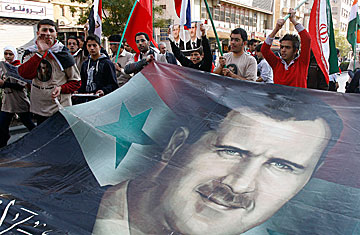
Syrian demonstrators shout slogans and carry a huge banner of Syrian President Bashar Assad during a protest against the Arab League in the capital Damascus on Nov. 25, 2011
The Arab League tightened the screws on beleaguered Syrian President Bashar Assad on Sunday, imposing economic sanctions on Damascus just weeks after suspending its membership in the 22-state body. The questions now are: What more can the league do and how — and against whom — might the Damascus regime retaliate?
Indeed, the unprecedented move against a fellow Arab state came with a sharp warning to Syria: Deal with us or pave the way for non-Arab intervention. "If we, as Arabs fail, do you think that the international conscience will remain silent on this issue for ever? I don't think so," Qatari Prime Minister and Foreign Minister Sheik Hamad bin Jassim al-Thani told a press conference in Cairo on Sunday. Syria says "leave us alone, you're interfering, but they're not telling us how they want to solve this," he added. "All this work we're doing is to avoid interference, but I cannot guarantee that there will be none."
At the press conference in Cairo, the Qatari Foreign Minister seemed exasperated by Syria's defiance. He described himself as almost a resident of Egypt having spent so much time there negotiating among the various representatives of the Arab states. Al-Thani was plaintive. "We don't want to harm or not harm [the regime]. We want the Syrian brothers, the Syrian regime to understand that there is an Arab decision, in line with the Syrian people, to find a solution to this problem, to stop the killing, to stop the blood." He then appealed to the Syrian leader's conscience. "If you kill one innocent, it is as if you have killed all of humanity," al-Thani said, quoting a verse from the Koran. "Authority means nothing if you must kill your people to keep it."
The new sanctions, which are as potent in substance as they are symbolically, reportedly include a travel ban on key Syrian officials, a halt to commercial flights into the country, a freeze on government assets and an end to dealings with Syria's central bank as well as investments in the country. Their aim, according to Hamad and Arab League Secretary-General Nabil al-Araby, is to hurt the regime yet spare the people. Basic commodities and remittances, for example, are exempt from the list. But commercial exchanges are not exempt from the sting of the sanctions. The unstated aim may be to force a break between the business elite in Syria's two largest cities of Damascus and Aleppo and the regime. The idea is that if the merchant class starts to think the regime is hurting its interests and will continue to be bad for business, the businesspeople will ditch Assad.
Still, Syria has been used to sanctions for a while, having long been subject to Western restrictions on business. Although the U.S. and the E.U. recently introduced and strengthened their economic embargoes against Syria in a bid to further isolate the regime, Assad hasn't changed his behavior. The death toll continues to spiral (it has surpassed 3,500 in the past nine months). Security forces remain in Syria's cities and throughout the countryside. At the same time, the once largely peaceful demonstrations are morphing into armed insurrection, as military defectors get better organized and stage more offensive, rather than just defensive, actions.
But the Arab League's sanctions are nothing to be sneezed at. The asset freeze in the Gulf is expected to hurt. And the political oomph of decision is a hard slap at Damascus. Even Algeria, which has been ruled by autocratic Abdelaziz Bouteflika for decades, sided against Assad. Perhaps sensitive both to proximity and good relations with Syria's main non-Arab backer Iran, Iraq abstained from the vote.
However, Damascus still has an important pressure valve that may help it continue to withstand the sanctions. Lebanon voted against the Arab League decision. Lebanon, which threw off the shackles of 29 years of Syrian domination back in 2005, is now firmly back in Assad's palm, and as long as it remains there, its banks, porous border and labor market will continue to play their historic role as Syria's pressure valve, a buffer to absorb domestic problems and mitigate punitive international measures.
The political turmoil next door has already spilled overland into Lebanon, sharpening already stark differences between the turbulent country's pro- and anti-Syrian camps. The Syrian uprising is stirring a hornet's nest of ethnic and sectarian suspicions and highlighting why it is potentially more dangerous than revolutions in Tunisia, Egypt, Libya or elsewhere in the Middle East. Syria's friends — Iran and Lebanon's militant Hizballah movement — are also capable of delivering a retaliatory sting.
Predictably, Syrian state media slammed the sanctions, saying the "illegal" measures were aimed at the Syrian people. The state news agency ran a report from the country's Kurdish region of Hasaka, claiming that "huge masses" in the northeastern province condemned the Arab League decision and "the conspiracy hatched against the homeland with the aim of undermining Syria's resistant role."
